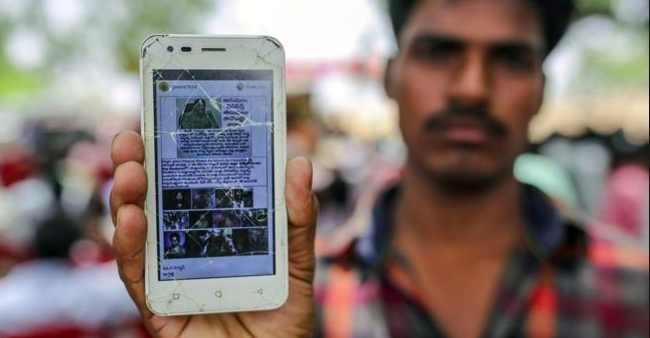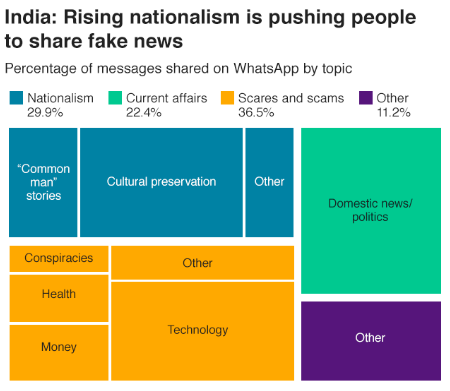Fake News Report on India, Kenya and Nigeria
November 14, 2018 | Expert Insights

Research done by the BBC on fake news trends in India, Nigeria and Kenya has shown that nationalism is driving ordinary citizens in India to spread fake news. The research in Africa suggested that national identity was insignificant in the spread of fake news.
Background
The Republic of India in South Asia is the second most populous nation in the world. Indian authorities have scrambled to combat a spate of murders linked to rumours circulating on messaging application WhatsApp. In the past year the murders of at least 30 people accused of being “child-lifters” have been linked to the platform, India’s most popular social media app with more than 200 million users. One of the victims had been hired by the government to tour villages with a megaphone to try to dispel rumours that gangs of child kidnappers were prowling the area.
WhatsApp, one of the most-used apps in the world with 1.5 billion users, has faced problems with misinformation in other large markets such as Brazil or Indonesia, but the consequences in India have been far more violent than elsewhere. The Facebook-owned social media app has become ubiquitous in India and been employed in innovative ways, including to assist rural doctors to get real-time advice from more experienced counterparts in cities.

Analysis
A BBC study that suggests WhatsApp is struggling to limit the spread of online disinformation on its service, has tried to analyse fake news trends in India, Nigeria and Kenya.
The research in India found that facts were less important to some than the emotional desire to bolster national identity. Social media analysis suggested that right-wing networks are much more organised than on the left, pushing nationalistic fake stories further. There was also an overlap of fake news sources on Twitter and support networks of Prime Minister Narendra Modi. However, this could be more due to the interconnected nature of social media accounts on the right.
The findings come from extensive research in the three countries into the way that ordinary citizens engage with and spread fake news. Participants gave the BBC extensive access to their phones over a seven-day period, allowing the researchers to examine the kinds of material they shared, whom they shared it with and how often.
The research, commissioned by the BBC World Service and published today, forms part of "Beyond Fake News”, a series across TV, radio and digital media that aims to investigate how disinformation and fake news are affecting people around the world.
In all three countries, the distrust of mainstream news outlets pushed people to spread information from alternative sources, without attempting to verify it, in the belief that they were helping to spread the real story. People were also overly confident in their ability to spot fake news. Participants in the BBC research made little attempt to query the original source of fake news messages, looking instead to alternative signs that the information was reliable.
These included the number of comments on a Facebook post, the kinds of images on the posts, or the sender, with people assuming WhatsApp messages from family and friends could be trusted and sent on without checking. Earlier this year, following government pressure, WhatsApp introduced a “forwarded” tag on some messages and put limitations on Indian users in an attempt to make them question the source of information, though the researchers found this had made little difference.
The research in Africa suggested that national identity was insignificant in the spread of fake news. In Kenya, scams related to money and technology were a stronger driving force, contributing to about a third of stories shared on WhatsApp, while fake stories relating to terrorism and the army were widely shared in Nigeria. In both countries, health scares were prominent among widely shared fake news stories, and many news consumers visited both credible and fake news sources without distinguishing between them.
Assessment
Our assessment is that rising polarization and the upcoming state and national elections are driving the explosive growth of fake news in India. We believe that the sheer flood of digital information being spread in 2018 is worsening the problem. From our assessment, we feel that WhatsApp is limited in what it can do to stem the spread of harmful rumours without compromising the encrypted nature of the software.








Comments